Our film opens with a text crawl explaining to the audience that, “At long last, the wars were over. The great king of Camelot had devoted his life to building a land of peace and justice. Now he wished to marry.” So, right off the top were left wondering if this is a sequel to a more exciting and possibly better movie. Who wants to watch a movie about royal senior citizen settling down to some peace and quiet? Lucky for us the crawl continues, “But the peace was not to last. The most powerful of Arthur’s knights, Prince Malagant, had long been jealous of the King’s glory. Now he found cause to quarrel with Arthur and left Camelot with hatred in his heart.” And exactly what caused Malagant to quarrel with the King? We never do find out why but I'd like to think it was because Arthur was one of those guys who double-dipped his potato chips.
“I will not follow a king with a poor party etiquette.”
The nasty Malagant (Ben Cross) has been making a nuisance of himself by burning down villages in Lyonesse, a small country ruled by Guinevere (Julia Ormond), which leads to her to going forward with an arranged marriage to King Arthur (Sean Connery), a marriage that is partly out of admiration for the king and partly for security against Malagant but also because she does love Arthur despite their 35-year age difference. While on route to Camelot Guinevere's carriage is ambushed by a group of Malagant’s soldiers, lucky for her a vagabond and skilled swordsman named Lancelot (Richard Gere) just so happened to be in the neighbourhood and he thwarts Malagant’s plan to kidnap her. After saving her from what was quickly escalating into an attempted rape Lancelot proceeds to hit on Guinevere because nothing sparks romance like sexual assault. Guinevere rightly slaps this asshole but his response to being slapped is to then forcibly kiss the woman in question and state, “I can tell when a woman wants me.”An Officer and a Gentleman he is not.
After saving Guinevere a second time, when Malagant’s men kidnap her right from under Arthur’s nose, Lancelot is offered a knighthood and a seat at the Round Table but the only reason he takes the position is so that he can hang around Camelot and perv on Guinevere some more, which is this film's idea of a chivalrous hero for some reason. Then after a victorious battle against Malagant’s forces, Lancelot finally decides mooning after another man’s wife is probably not such a great idea and tells Guinevere he is leaving, which she then responds to with a tearful kiss. This tender moment is, of course, interrupted by Arthur and thus this version of the Arthurian myth, and the love triangle that would destroy a kingdom is ended over something as lame as a goodbye kiss. I’ve watched Hallmark Channel movies with more interesting love stories than what is on display here.“Why has this script forsaken me?”
Stray Thoughts:• Guinevere is normally portrayed as the daughter of King Leodegrance, who was the king of Cameliard, not Lyonesse. In fact, Lyonesse is the Arthurian country most associated with the story of Tristan and Iseult.
• We are first introduced to Lancelot as he challenges local peasants to some swordplay for fun and profit, but was it common for the average 6th Century peasants to have swords of their own?
• An automated gauntlet is set-up as some kind of pre-wedding festive game but padded suits or not the swing axes and swords would kill any contestant hit by them. Did these people consider maiming a good omen for a wedding?
• When King Arthur finally leads his men out into the field against Malagant he brings Guinevere along for no logical reason. I know she’s supposed to be this brave and strong woman but you don’t bloody well bring your queen into combat situations.
• Arthur has his men set up a fake encampment, full of empty tents and dummies to look like soldiers so as to trap Malagant’s forces. I guess this King Arthur was a fan of Blazing Saddles.
• Apparently, during a public trial all guards manning the castle walls and gates are given the day off because that is the only way to explain Malagant and his army sneaking into Camelot, in broad fucking daylight, and no one noticing.
• We get none of the magical elements of the Arthurian legend, with no Excalibur or Merlin in sight, but we do get a Camelot that looks like a Disney theme park.
Camelot, the dullest place on Earth.
The removal of the mythical magical elements of the Arthurian legend has always befuddled me. Do movie execs think a more grounded version of a classic myth would be more palatable to modern audiences? If they wanted to make a simple medieval romance all they had to do was stop name-checking characters from the Arthurian myth because aside from the famous love triangle there is nothing that ties this particular story to Camelot, clearly, director Jerry Zucker and the folks over at Columbia Pictures wanted that name recognition so we’re stuck with a tepid bastardization version instead. But as bad an adaptation of the Arthurian myth First Knight is the worse aspect of this film is easily in the casting.A tale as old as time as well as being as old as Sean Connery.
The nonsensical changes to the Arthurian legend pale in comparison to the complete lack of chemistry between the film’s leads. Hollywood making King Arthur and Guinevere into some sort of May-December romance is nothing new – most notably in the 1953 epic Sword of Lancelot – but Sean Connery and Julia Ormond not only had to deal with a 35-year age gap but also the fact that they have zero chemistry on screen, and all of their scenes together are painfully dull to watch. Yet their complete lack of spark pales in comparison to the absolute zero levels of charisma that Richard Gere brings to the show. Lancelot is supposed to be King Arthur’s best friend and greatest champion but the version portrayed by Gere is that of a complete cad and a bounder. He’s just some bum travelling the countryside making money off the peasant folk, that is when he’s not hitting on women that are betrothed to someone else. In the legend Lancelot du Luc was a French knight who joined King Arthur's Knights of the Round Table while in this movie he's certainly not French – thank god they didn't try and make Richard Gere fake a French accent – and though Gere is a fine actor it's safe to say that period piece movies are not his thing as he was never once convincing as a 6th-century resident.I wonder what hair salon Lancelot uses.
The real crime here is that at two hours and fifteen minutes this movie feels three times as long, it’s just that boring. The battle scenes are barely interesting, the hero is about as likable as foot fungus and Sean Connery was clearly in paycheck mode throughout the film’s interminable running time. What’s interesting is that this isn’t even Sean Connery’s first foray into the Arthurian myth as he played the Green Knight in 1984’s Sword of the Valiant, and though that movie is a much worse entry than First Knight it still managed to be more entertaining.Words like lukewarm, boring and tedious are not what one would normally associate with the stories of King Arthur and the Knights of the Round Table but somehow Jerry Zucker managed to give us a bloated period piece with all the fun and excitement of those classic tales painfully excised.
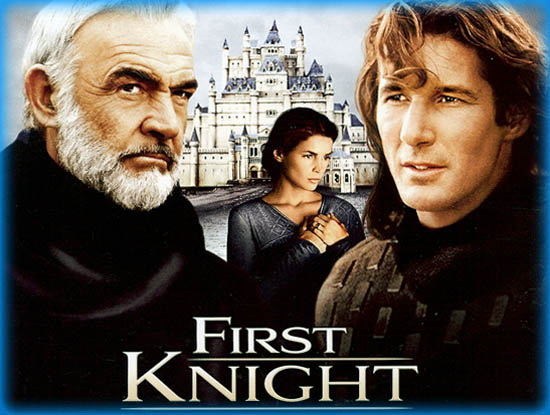
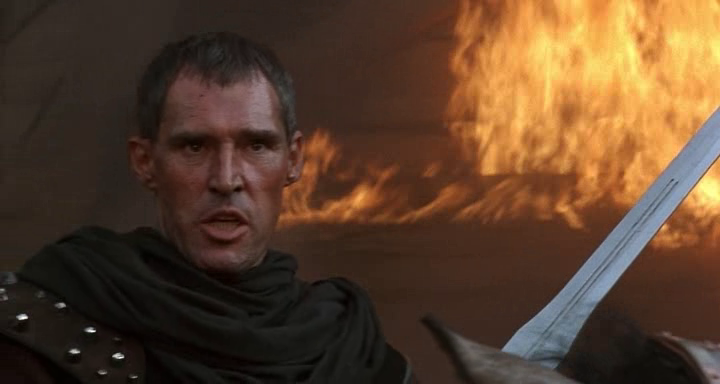
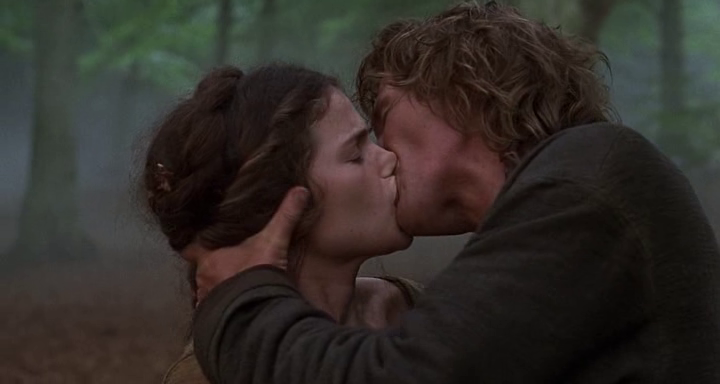
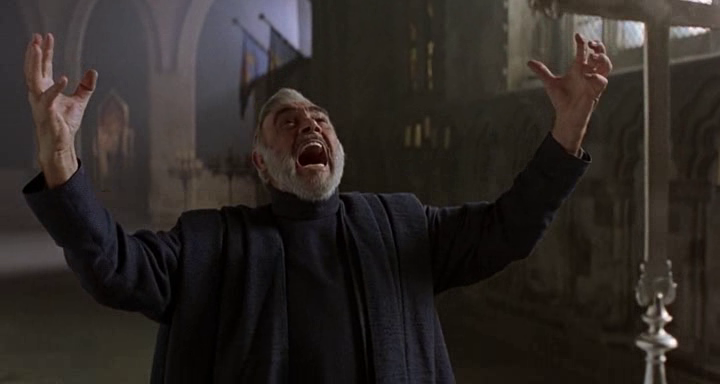
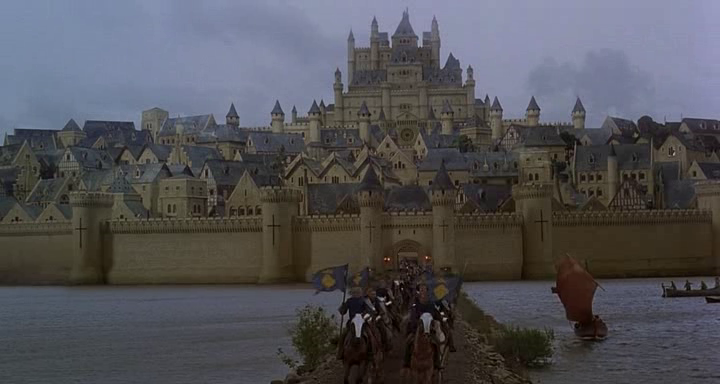
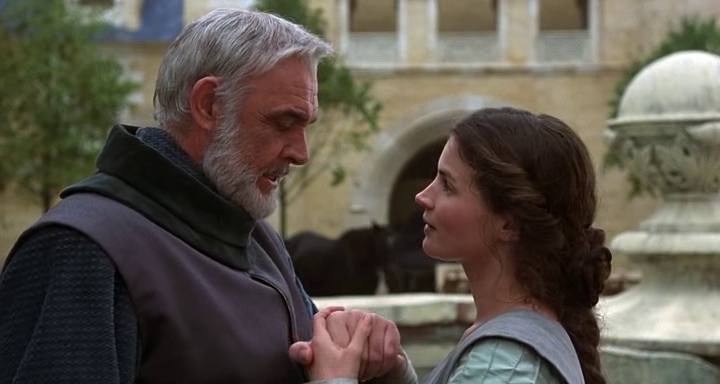
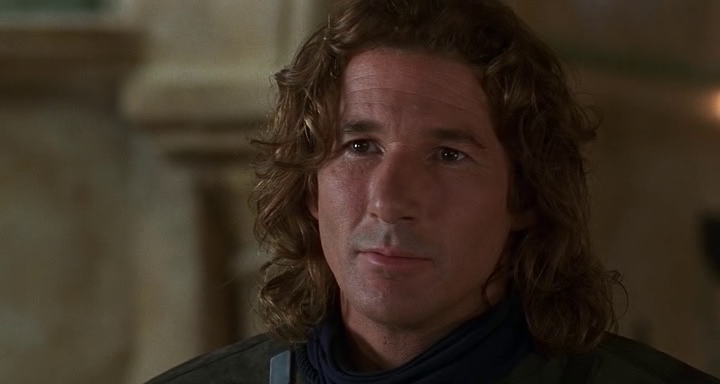

No comments:
Post a Comment